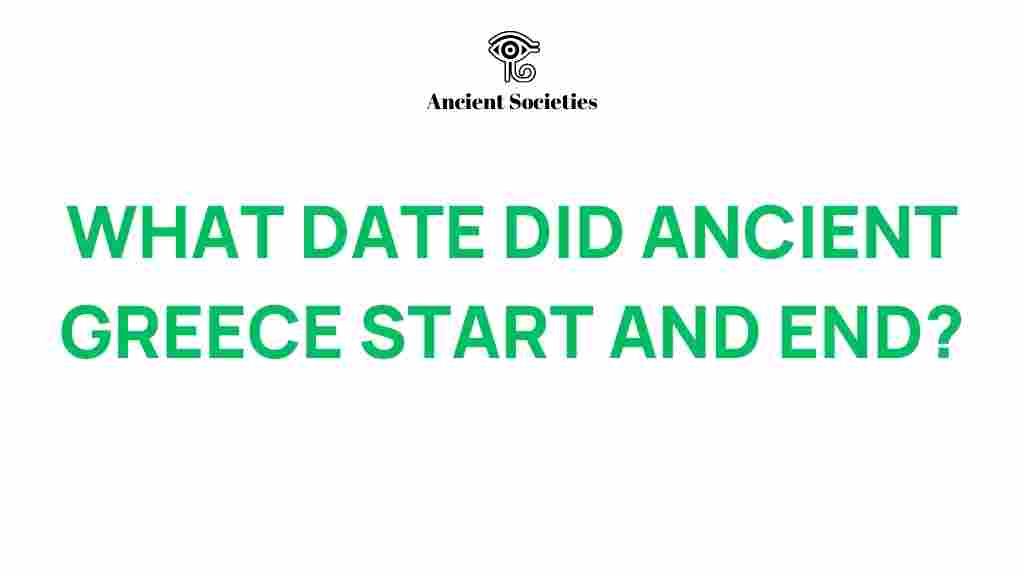Ancient Greece: When Did Its Story Begin and End?
The enigma of Ancient Greece captivates historians, archaeologists, and enthusiasts alike. This remarkable civilization has profoundly influenced modern society, shaping the realms of democracy, philosophy, art, and more. This article delves into the timeline of Ancient Greece, exploring its inception, evolution, and eventual decline while highlighting its rich culture and enduring impact on the world.
Introduction to Ancient Greece
Ancient Greece, often referred to as the cradle of Western civilization, is a term that encapsulates a vibrant period of history marked by significant achievements in various domains. Spanning from approximately the 8th century BCE to the end of the 4th century CE, Ancient Greece is characterized by its unique blend of mythology, art, and democratic governance.
The timeline of Ancient Greece is divided into several distinct periods, each contributing to the overall narrative of this fascinating civilization. Understanding this timeline is crucial for grasping the full spectrum of Ancient Greek history and culture.
The Timeline of Ancient Greece
To fully appreciate the complexity of Ancient Greece, it’s essential to break down its timeline into key phases:
- Geometric Period (c. 900-700 BCE): Marked by the emergence of city-states and the development of Greek art and pottery.
- Archaic Period (c. 700-500 BCE): Characterized by the rise of city-states, the introduction of coinage, and the beginnings of democracy.
- Classical Period (c. 500-323 BCE): The zenith of Greek culture, with remarkable advancements in philosophy, art, and politics.
- Hellenistic Period (c. 323-30 BCE): Following the conquests of Alexander the Great, this period saw the spread of Greek culture across the Mediterranean.
- Roman Greece (30 BCE-330 CE): The integration of Greece into the Roman Empire, leading to significant cultural exchanges.
Geometric and Archaic Periods
The story of Ancient Greece begins with the Geometric period, where communities began forming into city-states, known as polis. This era laid the groundwork for the social and political structures that would emerge later. The Archaic period saw the birth of significant cultural practices, including the establishment of the Olympic Games in 776 BCE, which celebrated physical prowess and honor.
The Rise of Democracy and Philosophy
One of the most profound legacies of Ancient Greece is the development of democracy. Athens, in particular, pioneered a system where citizens could participate directly in governance. This democratic framework influenced political thought for centuries.
Simultaneously, the Classical period heralded the golden age of Greek philosophy. Thinkers like Socrates, Plato, and Aristotle explored fundamental questions about existence, ethics, and the nature of knowledge. Their works remain foundational in various disciplines, influencing Western thought and education.
Art and Culture
In addition to philosophy, Ancient Greece is celebrated for its contributions to art and architecture. The construction of monumental structures like the Parthenon illustrates the Greeks’ architectural ingenuity and aesthetic principles. Greek art often depicted mythological themes, reflecting their rich mythology and religious beliefs.
Hellenistic Period: Expansion and Influence
Following the death of Alexander the Great in 323 BCE, the Hellenistic period emerged, characterized by the spread of Greek culture across a vast empire. This era saw the fusion of Greek and Eastern elements, leading to advancements in science, literature, and the arts.
- Literature: Significant works by authors like Theocritus and Apollonius of Rhodes emerged during this time.
- Science: Figures like Archimedes and Euclid made groundbreaking contributions to mathematics and physics.
- Art: The Hellenistic period produced a more emotional and dynamic style in sculpture, as seen in works like the Laocoön Group.
Roman Greece and Its Legacy
By 30 BCE, Greece fell under Roman control, marking the end of its independent rule. However, the influence of Ancient Greece continued to thrive within the Roman Empire. The Romans adopted Greek culture, philosophy, and art, embedding it into their own civilization.
Despite the political changes, the ideals and contributions of Ancient Greece persisted through education, literature, and governance. This cultural legacy paved the way for the Renaissance and the modern world.
Archaeology: Unraveling the Mysteries
The study of Ancient Greece is heavily supported by archaeology, which has unearthed invaluable artifacts, structures, and texts. Key archaeological sites include:
- Acropolis of Athens: A symbol of ancient Greek civilization, housing the Parthenon and other significant structures.
- Delphi: The site of the Oracle, where ancient Greeks sought guidance from the gods.
- Olympia: The birthplace of the Olympic Games, revealing insights into athletic practices and religious rituals.
Troubleshooting Your Understanding of Ancient Greece
While learning about Ancient Greece can be exhilarating, it might also pose challenges. Here are some troubleshooting tips for a clearer understanding:
- Focus on Key Figures: Familiarize yourself with influential personalities like Pericles, Homer, and Aristotle to contextualize historical events.
- Explore Primary Sources: Reading works like “The Iliad” or “The Republic” can provide direct insights into Greek thought and society.
- Visual Aids: Utilize maps and timelines to visualize the geographical and chronological aspects of Ancient Greece.
Conclusion
The story of Ancient Greece is a tapestry woven from the threads of history, culture, and intellectual achievement. From its inception in the Geometric period to its integration into the Roman Empire, Ancient Greece has left an indelible mark on humanity. Its contributions to democracy, philosophy, art, and mythology continue to resonate in contemporary society.
Understanding Ancient Greece through its timeline and cultural evolution not only enriches our appreciation of the past but also offers valuable lessons for the future. For more insights into ancient civilizations, you can explore this informative resource that delves deeper into the wonders of our shared history.
As you embark on your journey through the annals of Ancient Greece, remember that its story is still unfolding in the influence it has on our modern world.
This article is in the category History and created by AncientSocieties Team
